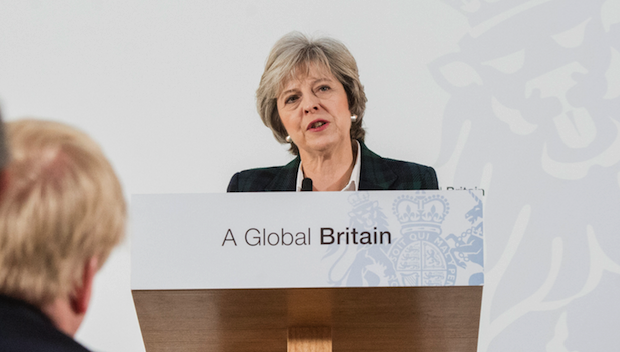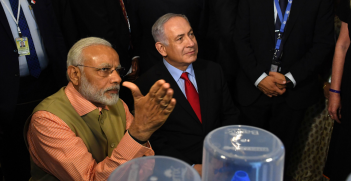Post-Brexit UK Trade: Reinventing the Wheel?

With Brexit moving through the British parliament, the UK government needs to consider how it will approach trade agreements once it leaves the European Union. Without the negotiating weight of the EU, it may be difficult to maintain standards UK consumers have become accustomed to. Will it mean reinventing a perfectly good wheel?
UK Prime Minister Theresa May has staked the political landscape for ‘taking back control’ post-Brexit and specifically identified a free trade agreement (FTA) with the US as a key measure of her government’s success. May’s meeting with US President Donald Trump gave that assurance and, for the moment, provides some political cover but it may not be too long before the UK’s limitations in setting its own trade agenda are exposed.
As an independent player, the UK has been out of the global trade-negotiating environment for decades. That environment is now defined through a myriad of bilateral and regional FTAs legally framed to complement trade objectives, primarily defined by the EU and the US. They hold many similar objectives but there are major fault lines that were revealed for all to see in the EU-US negotiations on the Transatlantic Trade and Investment Partnership (TTIP).
The TTIP identified some profoundly difficult trade and regulatory issues that are unlikely to be resolved easily and have cemented some red-line public policy issues that will continue to affect EU and UK decision-making. May’s government will not be able to ignore this inherently difficult agenda.
In the short term the general antagonistic coverage of EU regulations in the media may continue support for Brexit. However some media outlets, commentators and think tanks are now prepared to delve more deeply into the policy issues, raising the level of intellectual debate and generating a greater understanding of the task ahead for policymakers.
The fact or fiction of EU regulation
Teasing out the anti-globalisation issues should be an important part of the political process. This includes understanding better the sensitivities around anti-globalisation in the UK and across Europe. It also means recognising that the strong criticism of the TTIP was in large part a movement to protect one of the EU’s strongest features, the ‘values’ and regulations designed to address consumer and public safety and security standards, mostly not provided by the market.
Although far from perfect, the EU can claim to have developed some of the highest consumer standards for food safety, the environment, public health policies and privacy protection. But member states have tended not to own or promote these decisions, often forcing the EU Commission to decide and take the political flak. President of the European Commission Jean-Claude Juncker is now trying to force change into this process, challenging member states to take political responsibility.
Paradoxically, many of the EU standards criticised by Brexiteers are used to develop global public policy for trade, food and safety. For example, Australia and many other countries selectively use EU and US research to regulate chemicals, pesticides, additives, food safety and new industries such as nanotechnology. This research and its standard-setting role is vital for the public’s security in the broadest sense and often underpins and facilitates global trade.
But political differences between EU and US priorities, culture and policies often result in policy or regulatory rules that reflect the political balance between consumer and corporate competing priorities—defining testing standards and interpretations of ‘safety’. These differences also play out in trade negotiations, setting global standards around food, and other health security areas.
For example, the safety focused ‘precautionary principle’ that underpins much of the EU’s decision-making contrasts with the self-regulatory focus of the US in significant policymaking areas. The resulting policy settings and regulatory frameworks reflect differences in standards, legal obligations and cultural acceptance, which can feed anti-globalisation tensions.
Cutting red tape
It was not until the EU entered into bilateral trade negotiations with the US that the EU Commission’s negotiators experienced the full force of the US political and corporate drive to alter some of the EU’s most politically sensitive food safety and consumer oriented policies. These included differences in access provisions and contentious regulations linked to genetically modified food, nanotechnology, labelling obligations, food safety, the use of antibiotics and privacy concerns.
Political consequences
EU consultative processes encompass access for consumer groups to influence outcomes, including seeking to preserve established EU policy positions such as import bans on ‘chlorinated chickens’. On this and many other public policy issues, consumer outrage proved a strong counterweight to the US trade facilitation agenda. The TTIP is now on hold and the earlier push to alter intellectual property and copyright obligations through the Anti Counterfeit Trade Agreement (ACTA) was eventually blocked by the EU parliament.
In both treaty negotiations, EU member states had set these political mandates enabling US and EU corporations to pursue an assertive ‘trade facilitation’ agenda. But as the checks and balances embedded in EU governance came into play, the direction being taken was challenged. The European Commission could not contain the political backlash from a broad coalition of EU citizens nor could it contain the political response from the EU parliament.
The fact that these EU checks and balances influenced two of the most aggressive trade agendas—the TTIP and the ACTA—illustrates the capacity of citizens within the EU structure to ‘take back control’ This capacity was generally ignored by the UK leadership; instead, it focused political arguments in favour of concentrating on a narrow economic and financial rationale, which ultimately failed.
The UK’s new world order
With trade policy now at the forefront of UK discussions—and tariffs only one element—the EU’s policy focused regulations may prove to be extremely difficult for the UK government to navigate when negotiating new FTAs. These issues were highly sensitive well before politicians and commentators discovered populism as a major problem. But with EU politicians now well aware of these sensitivities the UK will not be able to trade its products with the EU unless fully consistent with EU rules and standards.
It will be a novel experience for the UK to negotiate without the political power of the EU behind it; and it is worth registering that even under Obama, the US would not tolerate an agreement that embedded specific EU food safety and other consumer standards and safeguards. President Trump’s administration appears set to erode many existing US standards, lowering the regulatory threshold further. This could embolden US corporations’ demands (and UK industry’s support) for this ‘behind the border’ anti-regulatory agenda.
The identified complexities attached to the UK’s trade options will continue to register as Brexit evolves. This process may even help educate the UK public about that which was undervalued and discarded through Brexit. It could also lead to significant numbers of leave and remain voters adopting stronger anti-globalisation views—a very different political mélange from Brexit politics. Chlorinated chicken and many other issues will no doubt be marked as ‘highly politically sensitive’ on the menu of FTAs the UK government intends to negotiate.
Anna George is adjunct professor at the Sir Walter Murdoch School of Public Policy and International Affairs at Murdoch University. She is also a former Australian ambassador and multilateral negotiator.
This article is published under a Creative Commons Licence and may be republished with attribution.





